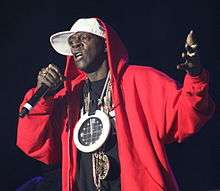Hype man
A hype man in hip hop music and rapping is a backup rapper and/or singer who supports the primary rappers with exclamations and interjections, and who attempts to increase the audience's excitement with call-and-response chants.[1][2]
Music writer Mickey Hess expands the term as follows: "a hype man is a figure who plays a central but supporting role within a group, making his own interventions, generally aimed at hyping up the crowd while also drawing attention to the words of the MC".[3]
Discussing the role of the hype man in the book How to Rap, Royce da 5'9" describes how a hype man can contribute to a live performance: "a lot of my verses [can] be so constant with the flow [that] I'd need somebody to help me."[4] Lateef has stated, "You're gonna have to have somebody say something somewhere to give you a breath... usually it's just a matter of getting somebody to hit some line or some word in a line - that's all you really need."[4]
Origins


Early hip hop hype men included Cowboy and Creole of Grandmaster Flash and the Furious Five.[1][3] Kool Moe Dee calls Creole “the original hype man”.[5]
The quintessential hype man, for many fans and musicians of the era, was Public Enemy's hype man Flavor Flav, whose exuberant approach to the art in the group's recordings and videos made him, arguably, the first household-name hype man, a figure more famous than many MCs. He established many of the conventions of the craft, such as an outlandish sense of style (epitomized by his wearing of large clocks around his neck) and a vocal style that contrasted dramatically with that of the MC (his rasping high voice was a counterpoint to Chuck D's booming baritone).
Jay-Z began his career as a hype man for Jaz-O[6][7] and was later the hype man for Big Daddy Kane.[8]
Notable examples
- Too Big MC for MC Hammer
- Skerrit Bwoy for Major Lazer
- Proof and Mr. Porter of D12 for Eminem[3]
- Flavor Flav of Public Enemy
- Freaky Tah of The Lost Boyz[3]
- Memphis Bleek for Jay-Z[3]
- Tony Yayo for 50 Cent
- Lil Jon for numerous artists
- Joe C. for Kid Rock
- Dapwell for Das Racist
- Yo-Landi Vi$$er of Die Antwoord, described as a "hype girl"
- Fatman Scoop for several artists
- Crunchy Black for Three 6 Mafia
- Bez for Happy Mondays
- Puff Daddy for Notorious B.I.G. and Mase
- Jasper Dolphin of Odd Future for Tyler, The Creator
- Sen Dog of Cypress Hill
- Danny Boy of House of Pain
- Safaree Samuels for Nicki Minaj
- DJ Khaled for himself
- Erik DeVito for EDCE
Icons of Hip Hop also notes that some producers, such as Diddy, Lil Jon, Swizz Beatz, and Jermaine Dupri, "have transitioned from a hype man role to become rappers and stars in their own right".[3]
See also
- Zasuul, a kind of hype man in Mongolian wrestling
References
- 1 2 "The Hilltop - The Role of The 'Hype Man' In Hip-Hop". Thehilltoponline.com. Retrieved 2010-08-12.
- ↑ Barrett, Grant, 2006, The Official Dictionary of Unofficial English, McGraw-Hill Professional, p. 182.
- 1 2 3 4 5 6 Hess, Mickey, 2007, Icons of Hip Hop: An Encyclopedia of the Movement, Music, and Culture, Greenwood Publishing Group, p. 176.
- 1 2 Edwards, Paul, 2009, How to Rap: The Art & Science of the Hip-Hop MC, Chicago Review Press, p. 304.
- ↑ "Kool Moe Dee". Thafoundation.com. Retrieved 2010-08-12.
- ↑ "Record Executives Thought Jay-Z Was No Good » MTV Newsroom". Newsroom.mtv.com. 2009-08-26. Retrieved 2010-08-12.
- ↑ Vibe magazine, Jan 2004, Vol. 12, No. 1, published by Vibe Media Group, p. 75.
- ↑ Jonathan Cunningham (2007-03-15). "Kane's Domain - Page 1 - Music - Broward/Palm Beach - Broward-Palm Beach New Times". Broward/Palm Beach. Retrieved 2010-08-12.